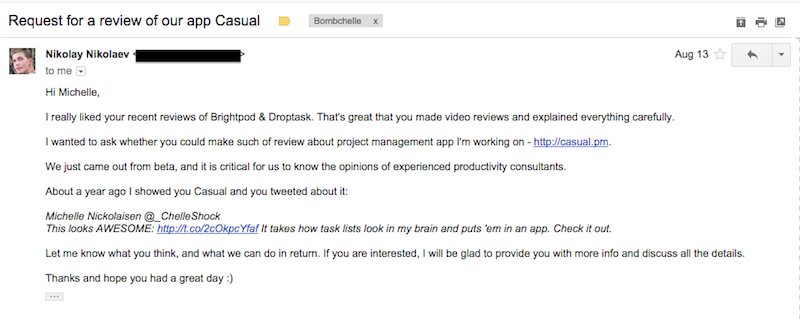
As a PR professional, you’re busy. I understand that. I also understand that you’re probably being forced to do at least some of these things by your boss. Or that you’re working on a budget and marketing your own product, and somebody told you these tactics work.
Butttt….
These annoying, time-wasting emails have to cease, ASAP. On behalf of everyone on the receiving end of them, I’m begging you: Please. Stop.
Read this post. Fix your next batch of PR emails. Save time by not sending useless emails that don’t get results and infuriate the recipient.
Here’s what you need to know to do that:
All bloggers/writers are not the same.
I don’t know if this is an old-guard vs new-guard (is “new guard” a thing?) PR issue, but I regularly get pitches that are for “newsworthy” type topics. Things like “this company released a new product” or “we’re hosting a conference” aren’t super relevant to me as a writer, since I never write news coverage.
Similarly, someone who does short write-ups of local events doesn’t want to be pitched on your app. And someone who writes about social media trends doesn’t care about your CEO’s philanthropy.
While we’re at it, please stop sending emails that have no actual information in them and say to refer to the attached .doc press release. It’s not 1999, I don’t want to have to fire up Word just to know what your email is about.
Do your research.
Once, somebody emailed me wanting me to review their educational app for 3–5 year olds. My entire YouTube feed is reviews of business-related apps, mostly productivity/project management apps for freelancers. That pitch is so far off base, it’s not even in the same ballpark. It’s like three miles away from the stadium in the warehouse district.
We don’t want to get form emails.
I have never opened an email that started with “Hi,” then immediately segued into a copied-and-pasted pitch, and reacted like so:

I’m pretty sure nobody else has, either.
I know you’re busy, but the very least you can do is put a name in the email. The next (tiny) step up would be telling the recipient why you think this is relevant to them. It won’t kill you.
Stop with the excessive follow up.
If a writer didn’t reply to your first three emails where you mass-pitched with a copied and pasted email, they’re probably not going to reply to your fourth email. Or write something about you/your company. Stop wasting their time (and yours).
Don’t argue with us.
In one very memorable incident, which has been duplicated to lesser degrees since then, a company (which we’ll come back to in a moment) pitched me on their app via Twitter. I replied & said it wasn’t a good fit for a review, since it didn’t look like it was intended for freelancers (my primary audience for reviews).
This marketing person then proceeded to argue with me on Twitter about how freelancers would want/use a tool that was $50/month…so they could use Gantt charts.

Needless to say, I was not sold by somebody I didn’t know lecturing me about what would be relevant to me and my audience.
Whoever you’re pitching is the expert about what’s relevant to their audience and what performs well for them. And in our online, metrics-driven world, if something doesn’t do well, there’s often repercussions, ranging from time wasted to getting a lecture from their boss/client. If they say it’s not a good fit, leave it alone.
We’re all busy and nobody wants to work for free.
Somewhere along the line (maybe with Ryan Holiday?), this myth started that all bloggers, everywhere, are just waiting to be handed content by PR folks. We spend all day anxiously staring at our inboxes, keyboards at the ready to instantly turn your press release into a blog post.
It probably doesn’t need to be said, but: this is not true. (Or rather, it’s only true for a very specific subset of writers who do a specific style of writing—refer back to point one.)
Everyone you email is busy, and when you send them a totally irrelevant pitch email, it feels like you’re wasting their time. When you send them a totally irrelevant pitch with an air of entitlement, acting like they’ll be super-grateful for the chance to cover your event/app/whatever, it can be downright infuriating.
When you email writers asking them to…
- review your app
- edit an old article (on a client site, sigh) to mention your app
- write anything that isn’t specifically client work
Remember: you’re not the one paying us.
As a rule, writers don’t owe you anything. Getting pissy when we turn you down, or when we take a few days to reply (because we have to wade through a slew of time-wasting emails) is just bad form.
Stay organized and stop the stalking.
Remember that company I referenced above, the one that argued with me on Twitter? That wasn’t even the end of it.
Over the course of a few weeks, that company:
-
- Sent me a form pitch email
- Took over two weeks to reply to my reply to their form pitch email
- Left several spammy comments on articles I’d written around the web, clearly written by marketing people for this app, suggesting I look into reviewing it
- Argued with me on Twitter about how I should review it
- Said they’d set up an account with a test environment for me to check out (but didn’t actually do so)
- Last but not least, emailed less than a week later asking when the review would be live (not if I’d decided to review it—when the review would go up)

Aside from this being a case study in what not to do at every turn, it was borderline creepy. It made me wonder if anyone at that company ever spoke to anyone else there. And it could have been prevented so easily.
This is why there are approximately a million and one CRM apps out there specifically intended to prevent scenarios like this. Make your team start using one and stop stalking writers. (And don’t reward “persistence” like that, because you’re probably just really pissing people off.)
Now that we’ve covered the don’t’s, let’s talk about the do’s:

This example from Nikolay at Casual, is well over a year old, but I keep using it because it’s such a great example.
A step by step of why this worked:
-
-
- Clear subject line. Like everyone, I get a lot of email. It’s a pet peeve of mine when a pitch email is disguised as something else via an unclear subject line (whether it’s intentional or not). If I can’t tell what it is without opening, I don’t want to open it, and I’m already annoyed when I do.
- His opening sentence shows that he’s actually checked into my recent review history and the type of content I do. This clearly isn’t a bland copied and pasted pitch email, which automatically endears me to him. Nobody wants to feel like they’re on the receiving end of a form email.
- He nicely asks for a review. Which is the whole purpose of his email.
- He politely reminds me that I had previously mentioned them. Which sparks my memory and makes me think, “Okay, if I liked them before, they’re probably actually a good fit for my audience.”
- And he closes on a friendly but professional note.
-
I reviewed Casual a few weeks later (the video now has over 2,500 views) and he followed up with a thank you note, along with retweeting some shares of the articles.
This is an industry specific example, but there are universal takeaways:
-
-
- Use a clear subject line.
- Keep your email short & sweet.
- Research who it is that you’re talking to, and tell them why you think they’d be interested.
- Remind them of any previous interactions (should they exist) so the writer knows who you are.
- Don’t use form emails, or if you do, at least modify them for the recipient.
-
Other good rules of thumb:
-
-
- If the writer replies with questions, reply back ASAP. We’re all on deadlines. If you take four days to reply, don’t be surprised if they move on to a different topic/source/whatever for their article.
- Include enough information that the writer can tell if it’s a good fit without having to ask for more information. You don’t want to give them a 1,500 word pitch, but summarize it in a few sentences with a link to someplace they can get more information.
- More tips here: Give good quote: how to make it easy for people to feature your business
- Finally, just don’t be a douchebag. The internet has enough of those already.
-
And that’s how it’s done, folks.
Now go forth and send better pitches.
Featured image credit: via
